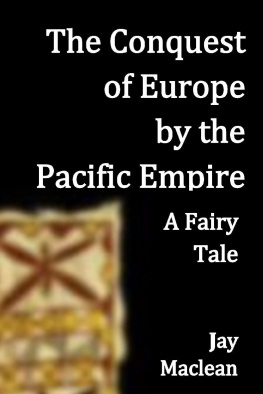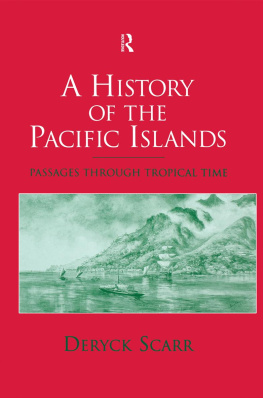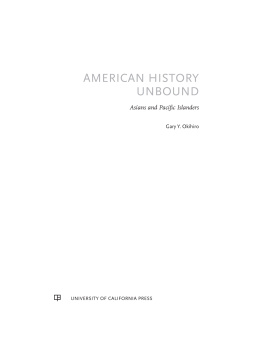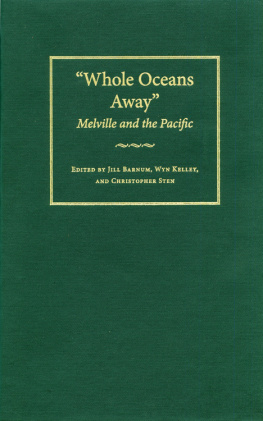MORE BY JAY MACLEAN
Crying Trees, Killer Fish and Rental Corpses
Mostly in Economy Class
Sometimes in Business Class
Found, Lost, Paved and Sunk: Paradise
Electric Angels and Pink Bikies
Black Pearls and Red Tide
In a Perfect Ocean: The State Of Fisheries And Ecosystems In The North Atlantic Ocean (The State of the Worlds Oceans)
Rice Almanac
Ecosystem Approaches to Fisheries: A Global Perspective
Biology, Epidemiology, and Management of Pyrodinium Red Tides: Proceedings of the Management and Training Workshop, Bandar Seri Begawan, Brunei Darussalem, 23-30 May, 1989
SEE MORE AT JAY MACLEANS AUTHOR PAGE
TABLE OF CONTENTS
J
Cover: Samoan tapa cloth, 1890s (Wikipedia Commons)
PROLOGUE
TODAY, THE PACIFIC ISLANDS REFLECT the best and worst in western society. On the one hand are the bravery and persistence of early European navigators, missionaries, and government officers; the early, well-meaning efforts by many westerners to help the islanders become civilized; the assistance readily given in times of natural disasters; and the grants and concessional loans to help Pacific countries develop into independent economic entities, to name but a few. On the other hand are the persistence in demolishing the islanders tropical culture and turning them into unwilling citizens or dependents of temperate countries, like puppets; the arrogance of assuming that modern western democracy and societal norms, which date back but a few generations, must replace the islanders far longer-standing societies; and the continuation of all these efforts to westernize them and their countries in the face of growing awareness in those Pacific countries of the value of their own well tried-and-tested lifestylesto name but a few.
What if history had gone another way? What if the Pacific islanders had taken over Europe instead? That would have been impossible, of course, or would it?
A LITTLE HISTORY
IN THE DAYS BEFORE TIME, that is before time could be accurately measured, the Pacific Ocean and its islands comprised nearly the whole known world, according to the legends of the first people, the Primesians, to occupy the islands of this ocean. The islands of their empire covered hundreds of thousands of square kilometers. Their tiny lands and the vast seas they crossed from one to another made up a huge empire ruled by a council of elders that, because of the distances between islands, only met once every five years. It was, in size, the biggest empire that the world has ever known.
Beyond the empire, were some islands in the far west, whose inhabitants were not great seafarers. Occasionally one of their strange sailing canoes was blown into the empires ocean. From these visits, the empire learned that the western islands were similar to theirs, though much bigger and only a few among their peoples bothered to take to the sea. The islanders of the empire, seeing no harm in them, gave them food and water and allowed them to stay until favorable winds would carry them back. Their islands were too far away to consider any kind of alliance.
In the east, there was said to be a large island beyond the edge of the ocean that stretched far to the north and to the south with mountains rising higher than any in the empire. No one in the empire knew any more than that.
Centuries ago, the elders commissioned Artemi, the greatest navigator in the empire, to find the island in the east to learn whether it posed any future threat to the empire or, if uninhabited, could be made part of the empire.
Artemi was said to have been an unprepossessing islander, neither of grand stature nor a weakling. His hair was long but not very wavy; his skin was the color of honey. He wore a short loin cloth like all the men on his island. What set him apart was the fire behind his dark eyes, the fire that lit up and threw out sparks whenever the prospect of exploration was raised. He was an extraordinary navigator, the founder of the empires modern navigation techniques. By observing a single leaf in the water, he could tell how far and from which direction it had come and so could name the island on which it grew. No wonder he was chosen to find the almost mythical island in the east.
The account of Artemis voyage became a favorite legend around the empire, related up to this day by travelers from island to island, by citizens from house to house, and by parents to children. It has a bearing on our story so it is worth repeating here.
A date for the voyage, when the winds and currents would be favorable, was chosen by the elders. Artemi set off with a small group of sailors to much fanfare on four well-stocked double canoes, each equipped with several sets of sails and oars. The explorers traveled ever eastward, sometimes following currents, scudding along before a storm, or rowing against a gale.
There are legendary stories of their bravery. They encountered seas bigger and more formidable that any sailors before them; storms that threatened to break apart their canoes; and winds that tore sails from the masts. Different story tellers in different islands have made much of these adventures and of the prowess and endurance of individual sailors and of Artemi, who kept their spirits up as they sailed further and further into the unknown. The history of the empire has always been passed down from generation to generation in story form. Some story tellers can keep an audience enthralled for several days in describing the details of the harrowing crossing of the Pacific Ocean by Artemi and his fellow sailors with the ocean. We will pass over these accounts, because a greater voyage was in store for the empire, one on a far grander scale. Had it failed, this story could not have been written.
So it was that after nearly five moons, the sailors spied the mountainous island, its peaks hidden in clouds that formed a white cap as far as they could see to the north and south.
The sailors hauled their canoes up a deserted beach. Venturing inland, they soon realized it was inhabited. Before them were groups of people working in a field. These people were of much the same appearance as themselves in the color of their skin and hair; their clothing was the small loin cloth that islanders use, and their tools were similarly made of stone and wood.
They made the exhausted sailors welcome; gifts were exchanged and the sailors were led to a large village in the mountains where they were astonished to see massive pyramid-shaped temples built of stone. The temples were a great source of wonder to them because there was nothing like them in the empire and because they saw no purpose in such huge edifices; only a very few people were allowed to enter them. The islanders of the empire lived with nature, encroaching as little as was necessary on the land and always took care to appease any gods of the forests and shores that might be upset by their actions.
As they stood gazing at these massive monuments, the strangers suddenly seized them and dragged them into a clearing in the middle of the village, where they were tied together and displayed to the villagers. Before long, the whole population of the village had gathered to look and jeer at them. Then, in a horrific ceremony at the foot of one of the stone pyramids, some were tortured, killed and eaten; the others were made slaves.
In this condition, the survivors, including Artemi, endured more than three moons of cruel treatment. During their captivity, they carefully watched not only their captors but also the winds. As soon as the winds that had brought them to this land had turned to make the long journey back across the Pacific, Artemi made plans for their escape. This wind, they knew, was a wind that would be willing to carry westward any sailors who asked for its favors during the next four or five moons; and it would take that long to reach the homeland of the captive sailors.






